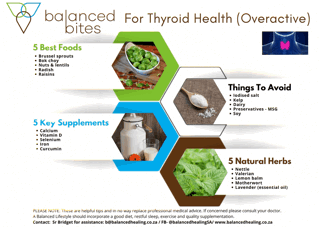Following on from last weeks post about hypo active thyroid, this week’s discussion is about hyperactive thyroid health.
What is Hyperthyroidism?
Hyperthyroidism is when your thyroid the butterfly-shaped gland at the bottom of your neck, just above your collarbone makes too much of a hormone called thyroxine.
Your thyroid controls things like how fast your heart beats and how quickly you burn calories. It releases hormones to control your metabolism (all the things your body does to turn food into energy and keep you going). Hyperthyroidism, also known as overactive thyroid, can speed up your metabolism and cause unpleasant symptoms.
Hyperthyroidism Signs and Symptoms
- Nervousness, anxiety, or crankiness
- Mood swings
- Fatigue or weakness
- Sensitivity to heat
- A swollen thyroid (called a goiter). You might see swelling at the base of your neck.
- Losing weight suddenly, without trying
- Fast or uneven heartbeat or palpitations (pounding in your heart)
- Shaking in your hands and fingers (tremor)
- Sleep problems
- Thinning skin
- Fine, brittle hair
- Changes in your menstrual cycle
- Having more bowel movements
Conditions and disorders of Hyperactive Thyroid
Graves’ Disease
This immune system disorder is the most common cause of hyperthyroidism. It’s more likely to affect women under the age of 40.
Thyroid Nodules
These lumps of tissue in your thyroid can become overactive, creating too much thyroid hormone.
Graves’ Ophthalmopathy
About 30% of people with Graves’ disease get a condition called Graves’ ophthalmopathy. It involves your vision and eyes, including the muscles and tissues around them. Symptoms include:
- Bulging eyes
- A gritty feeling, pain, or pressure in your eyes
- Redness or inflammation in or around your eyes
- Eyelids that are puffy or pulled back
- Sensitivity to light
- Double vision or loss of vision
Thyroiditis
An infection or an immune system problem can cause your thyroid to swell and leak hormones. This is often followed by hypothyroidism, in which your thyroid doesn’t make enough hormones. These conditions are usually temporary.You can also get hyperthyroidism if you get lots of iodine in your diet (like in a medication or supplement) or from taking too much thyroid hormone medication.
Balanced Bites For Overactive Thyroid Health

If you’re an older adult, you’re more likely to have subtle symptoms like a faster heart rate or being more sensitive to warm temperatures. Or you could just feel more tired after everyday activities.
Certain medicines can mask the signs of hyperthyroidism. If you take beta-blockers to treat high blood pressure or another condition, you might not know you have it. Be sure your doctor knows about all the medications you take.
When you first get hyperthyroidism, you may feel energetic. This is because your metabolism is sped up. But over time, this increase in your metabolism can break your body down and cause you to feel tired. Usually, hyperthyroidism develops slowly. If you’re young when you get it, the symptoms might come on suddenly.
If you are experiencing any of the above symptoms or suspect you may have any of the above disorders or conditions. Contact your local Healthcare Practitioner.
Balanced Healing can assist you with a personalised lifestyle plan to optimise your Overactive Thyroid Health.
Contact Sr Bridget Spargo @ 083 653 7470 or Email: b@balancedhealing.co.za to book an appointment.
References
Website: https://www.webmd.com/a-to-z-guides/overactive-thyroid-hyperthyroidism#1-3
Website: https://www.youtube.com/watch?v=0dgG5WFWghs

